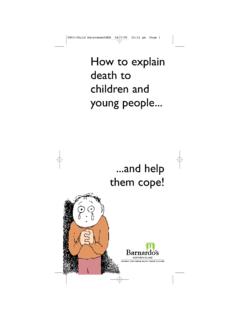Transcription of Supporting prisoners’ families - Barnardo's
1 By Naomi Clewett and Jane GloverSupporting prisoners familiesHow Barnardo s works to improve outcomes for children with a parent in prisonNovember 2009 Supporting prisoners families2 ForewordChildren who have a parent in prisoni are more likely than others to experience poverty, mental ill health, poor housing and other negative outcomes. Timely intervention not only addresses the immediate needs of this vulnerable group, but can contribute to improving future outcomes and breaking the cyclical nature of off ending that exists in many families . Barnardo s has been working in prisons and the community, with the children and families of off enders for over 10 years. This report outlines how we work with prisons, probation, children and adult services, the voluntary sector, and most importantly the whole family, to maintain family ties, increase family stability and improve outcomes for children . Lynda WilsonDirector, Barnardo s Northern Ireland2 Supporting prisoner s familiesTimely intervention can contribute to improving future outcomes and breaking the cyclical nature of off ending that exists in many families .
2 IntroductionIt is estimated that there are around 160,000 children of prisoners in the UK1 and seven per cent of children experience the imprisonment of their parent during their school Parental incarceration is linked to a variety of poor outcomes: children who have a parent in prison are three times more likely to engage in antisocial behaviour 3 and it is reported that 65 per cent of boys with a convicted father go on to off end 4 parental imprisonment is associated with negative school experiences such as persistent truanting,5 bullying 6 and failure to achieve in education7 children of prisoners are more than twice as likely to suff er from mental health problems8 and are at risk of poor physical health The fi rst in this series of briefi ngs, Every night you cry, presented the experiences and opinions of 15 families aff ected by parental imprisonment. This briefi ng outlines some of the work that Barnardo s is doing to improve outcomes for children and families like these across the UK.
3 Our work, while varied, consistently aims to involve the whole family in improving outcomes for the s works in partnership with prisons and other agencies from the statutory and voluntary sectors to deliver services dedicated to Supporting children and families of prisoners. All service provision is grounded in an understanding that: maintenance of positive family ties reduces the likelihood of prisoners reoff ending on release 10, 11, ii maintenance of positive family ties increases the stability of a child s life both during and after parental imprisonment children of prisoners are children in need, and provision of support to this group will help them to achieve the fi ve Every Child Matters outcomes. What does the statutory sector provide?Across the UK, unless a child of a prisoner is known to children s services or presents as a child in need for a diff erent reason, they come very low down the list of priorities and are unlikely to be off ered any targeted support.
4 A Barnardo s audit carried out in August 2009 showed that of 208 local authorities and health boards across the UK, only 20 make any reference to this group in their children s , iii Barnardo s practitioners in each of the four nations report that any funding they secure to support children of prisoners is usually short-term, and any progress that has been made has mainly been driven by the voluntary sector. Many prisons, in partnership with Barnardo s and other charities have invested in more child-friendly facilities, better visiting centres and family visits, but there is no consistency across the secure In England, the main focus for attention on children with a parent in prison has come through the children and families Pathway one of seven work streams established by the National Off ender Management Service (NOMS) to reduce reoff ending. However, there is currently no specifi c funding to support initiatives or consistency in how partnership arrangements between statutory and voluntary agencies work across the diff erent regions and Barnardo s works with children whose parents are in various stages of the criminal justice system, including those with community and prison sentences.
5 This paper focuses specifi cally on Barnardo s work Supporting families with children with a parent in prison. However, we recognise that many of the adverse outcomes associated with these two groups are the same and our work in both prisons and communities refl ects They are also more likely to have accommodation organised on release and have a better chance of fi nding, and keeping, a job or place in education or In 14 cases our audit relied on 2005-08 plans because these were the most recent prisoners families4 families do matter, an initiative originally funded by the Home Offi ce and HM Treasury under its Invest To Save Budget has expanded its remit to three new areas following a pilot project in the West Midlands. It is now funded by NOMS and the Department of children , Schools and families (DCSF) to forge partnerships between children and family service providers, probation and prison services. However, the funding for this work is only secured until the end of March guidance for children s centres14 recognises children of prisoners as a vulnerable group and guidance for children and young people s plans identifi es children of prisoners as a group requiring additional However, there is no specifi c guidance about the level or type of support required, and no earmarked funding is available.
6 In Wales, the Welsh Assembly Government is Supporting the delivery of the NOMS strategy and its associated initiatives to reduce reoff ending in Wales, but lack of funding remains a barrier. children aff ected by parental imprisonment are also included as children and Young People in Special Circumstances under Chapter 6 of the National service framework for children , young people and maternity services (2006), though evidence from self-assessment data suggests that implementation is Service provision in Northern Ireland and Scotland is better developed than in England and Wales, but there is still more to be Scotland, the Scottish Prison Service (SPS), on behalf of the Scottish Government, has recently published a new standard in relation to children and families of prisoners in It is currently being rolled out with local authority support to all prison establishments in Scotland, to improve the quality and consistency of policy and practice. The standard will include action to establish multi-disciplinary children and families groups in every prison that will focus on improving the visiting experience for children visiting prisons and developing and implementing child protection policies and procedures in order to keep children safe during visits and contact with prisons.
7 It will develop a more positive visiting experience through improving the appearance and facilities in visiting areas, provision for play and nursing mothers, information and support services and the training of staff . The timing and structure of visits between prisoners and their children will also be improved, particularly preventing enhanced family visits from being withdrawn as punishment. Any material changes in the delivery of services to children and families will also now be risk assessed using a children s rights impact assessment Northern Ireland, the Northern Ireland Prison Service has recently published a Draft family strategy (2009) for consultation, which would ensure development of the Family Support Offi cer role iv and family-centred visits at all three Northern Ireland Family Support Offi cers (FSOs) in each establishment are responsible for liaising between prisoner , families and external agencies to support the Family Strategy and the Resettlement Strategy.
8 The FSO supports the family from pre-court appearance throughout the custodial period. 5 Barnardo s supports children and families aff ected by parental imprisonment through 21 services across all four UK nations. Our experience convinces us that providing support to the whole family is the best way of protecting and promoting positive outcomes for children . We also believe that early intervention with families costs less than the likely spend on services to repair the damage made to families should problems be left to can be challenging environments for family-centred work. The awareness of individual governors of the importance of family ties can either limit or enhance the scope of services that projects are able to off er, and the availability of funding. The prison regime and security priorities also present a barrier to creating a relaxed space in which families can bond and discuss issues freely. Working as an independent organisation in partnership with prisons, police, probation and local authorities, Barnardo s is well placed to gain the trust of prisoners and families in order to pursue family-centred work that responds to local need.
9 In this report we focus on four Barnardo s services that are working in a variety of ways to improve outcomes for children with a parent in s work with children and families of prisonersSupporting prisoners families6 Barnardo s Parenting Matters in Northern Ireland has been using evidence-based practice to support parents in prison and their families since 1996. The service is funded by the Northern Ireland Prison Service, to work in all three prisons in Northern Ireland, delivering training sessions to parents in prison and their partners, one-to-one support, family days, information and signposting. Parenting Matters also works with various statutory and voluntary sector partners to infl uence policy and develop family-friendly service aims to achieve three distinct outcomes, that: family relationships are maintained and/or strengthened when a parent is in prison awareness is raised among key stakeholders regarding the importance of parent/child relationships during a period of imprisonment family stability and continuity of parenting is maintained and/or strengthened service delivers eight group courses to provide support and advice to parents throughout the full cycle of their imprisonment.
10 The programmes are tailored to respond to the specifi c needs of diff erent groups, for example Staying In Touch helps parents to explain their imprisonment to their child, Preparing For Release helps fathers prepare for family life, and Partners Together is a session that enables couples to learn how they can parent as a team. Service users then have the opportunity to celebrate their achievements at a family event facilitated by Barnardo s at the end of each course. Parent Facilitator Training is available for prison offi cers on a voluntary basis to enable them to co-facilitate the parenting programmes. The training is funded by the prison and accredited with an OCN level 3 qualifi The course takes place in the community and is attended by staff from a variety of agencies, including children s centres and social services, therefore improving the awareness of prison offi cers to other issues that families may be facing. One-to-one supportOne-to-one support is off ered to help prisoners work through individual concerns relating to their family, including child safety, access arrangements, and information about parenting programmes and family days.














